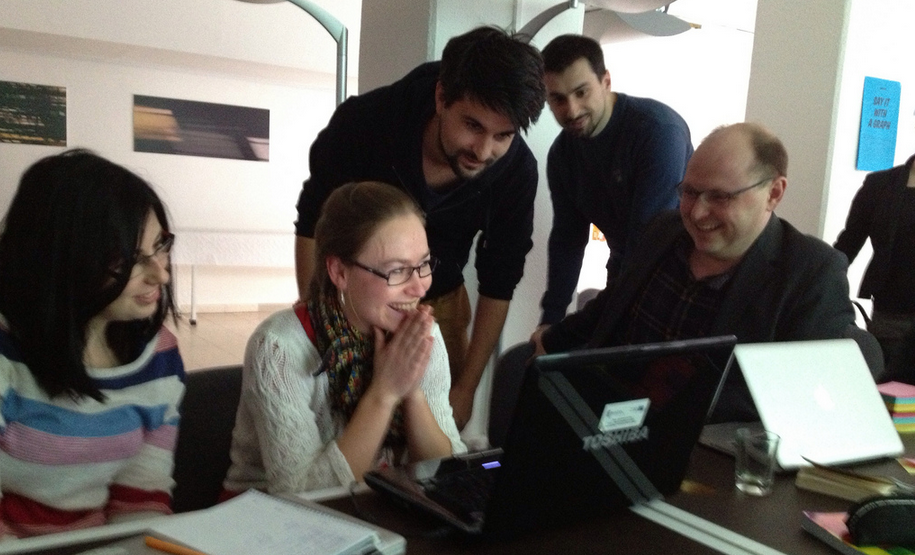This guest blog post has been written by David Eaves, public policy entrepreneur, open government activist and one of the initiators of Open Data Day. It was originally published on David’s blog.
So, with much help from various community members (who reminded me that we need to get this rolling – looking at you Heather Leson), I’m pleased to say we are starting to gear up for Open Data Day 2014 on February 22nd, 2014.
From its humble beginnings of a conversation between a few friends who were interested in promoting and playing with open data, last year Open Data Day had locally organized events take place in over 100 cities around the world. Check out this video of Open Data Day in Kathmandu last year.
Why makes Open Data Day work? Mostly you. It is a global excuse for people in communities like yours to come together and organize an event that meets their needs. Whether that is a hackathon, a showcase and fair, lectures, workshops for local NGOs and businesses, training on data, or meetings with local politicians – people are free to organize around whatever they think their community needs. You can read more about how Open Data Day works on the event website.
Want to join in on the fun? I thought you’d never ask. Listed below are some different ways you can help make Open Data Day 2014 a success in your community!
a) how can i let everyone know about open data day
I love the enthusiasm. Here’s a tweet you can send:
#OpenData Day is community powered in a timezone near you http://opendataday.org #ODD2014
Yes, our hashtag is #ODD2014. Cause we are odd. And cause we love open data.
b) i’d like to participate!
Great! If you are interested in participating in check out the Open Data Day wiki. We’ve just unlocked the pages so cities haven’t been added yet but feel free to add your city to the list, and put down your name as interested in participating. You can even check to see who organized the event last year to see if they are interested in doing it again.
c) forget about participating, i want to coordinate an open data day event in my city.
Whoa! Very exciting! Here’s a short checklist of what to do:
- If you didn’t organize one last year, check to see if anyone in your city did. It would be good to connect with them first.
- Read the Open Data Day website. Basically, pick up on our vibe: we want Open Data Day to work for everyone, from novices who know little about data to experts like Kaggle participants and uber geeks like Bruce Schneier. These events have always been welcoming and encouraging – it is part of the design challenge.
-
Okay, now add your city to the list, let people know where it will be taking place (or that you are working on securing space), let them know a rough agenda, what to expect, and how they can contribute.
-
Add yourself to the 2014 Open Data Day map. (Hint: Wikipedia lists Lat/Long in the information side bar for each cities wiki page: “Coordinates: 43°42′N 79°24′W”)
-
Join the Open Data Day mailing list. Organizers tend to share best practices and tips here. It’s not serious, really just a help and support group.
Check out resources like this and this about how to organize a successful event. -
Start spreading the news!
d) i want to help more! how can open data day work more smoothly everywhere?
Okay, for the truly hardcore of you: right, we need help. Open Data day has grown. This means we’ve outgrown a whole bunch of our infrastructure… like our webpage! Everyone involved in this is a volunteer so… we have some extra heavy lifting we need help with. This includes:
- a. Website template update: The current Open Data Day template was generously donated by Mark Dunkley (thank you!). We’d love to have it scale a little better and refresh the content. You can see the code on GitHub here.
Email me if you are interested. Skills required: CSS, design -
b. Translation: Can you help translate the ODD site into your language? You can submit the requests on GitHub or send a document to Heather Leson with the content. She’ll do the GitHub stuff if that’s beyond you.
-
c. Map: Leaflet and layers helpers wanted! We’d like a map geek to help correct geolocation and keep the 2014 map fresh with accurate geo for all the locations. GitHub repo is here and the event list is here.
What’s next?
I’m really looking forward to this year… I’ve lots more thoughts I’ll be sharing shortly.
Plus, I can’t wait to hear from you!
This post is by a guest poster. If you would like to write something for the Open Knowledge Foundation blog, please see the submissions page.










I think I just fixed the map. (c. above) The problem is that the data gets loaded in from the googledoc and there is no filter for format. If the location was entered as a decimal it’s fine, but d° m’ s” format doesn’t translate correctly, and W and S are not interpreted as negative longitude or latitude, respectively, so the marker is nowhere near the true location. I changed the values in the doc. I might try to write some javascript this afternoon…